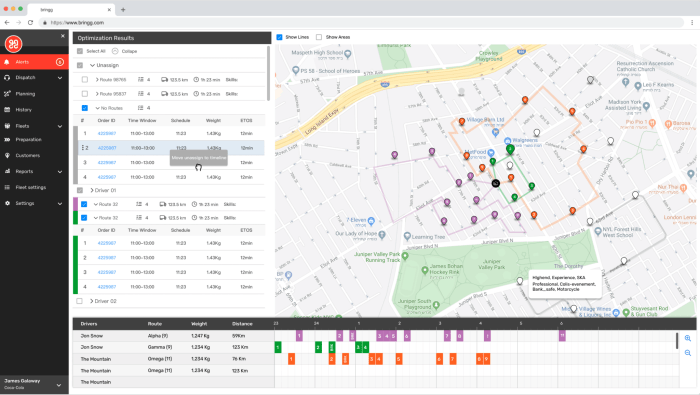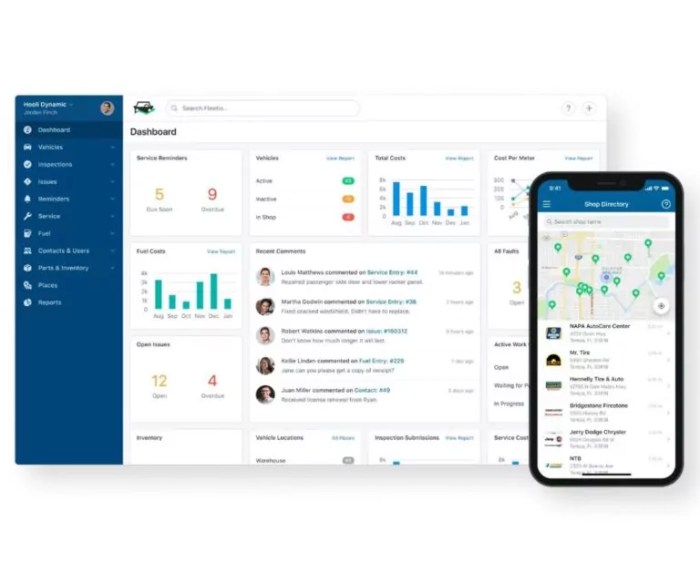Software for fleet management – In today’s competitive landscape, efficient fleet management is no longer a luxury but a necessity for businesses operating vehicles. Whether you manage a small delivery service or a large-scale transportation company, optimizing your fleet’s performance is crucial for profitability and sustainability. This is where fleet management software steps in, offering a powerful suite of tools to enhance efficiency, reduce costs, and improve overall operational effectiveness.
This comprehensive guide delves into the intricacies of fleet management software, exploring its key features, benefits, and considerations for successful implementation.
Understanding the Core Features of Fleet Management Software
Modern fleet management software packages are designed to integrate various functionalities into a single, user-friendly platform. These features typically include:

Source: bringg.com
GPS Tracking and Location Monitoring
Real-time GPS tracking is a cornerstone of any robust fleet management system. It provides accurate location data for all vehicles, allowing managers to monitor their movements, identify delays, and optimize routes in real-time. This feature is particularly useful for:
- Dispatch optimization: Assigning the closest vehicle to a job.
- Improved customer service: Providing accurate ETAs (Estimated Time of Arrivals).
- Theft prevention: Identifying unauthorized vehicle use.
Advanced systems may even incorporate geofencing, which triggers alerts when vehicles enter or exit predefined zones.
Vehicle Diagnostics and Maintenance Management
Many fleet management systems integrate with onboard diagnostics (OBD) systems to monitor vehicle health. This allows for proactive maintenance scheduling, preventing costly breakdowns and ensuring optimal vehicle performance. Key benefits include:
- Reduced downtime: Predictive maintenance minimizes unexpected repairs.
- Extended vehicle lifespan: Regular maintenance prevents premature wear and tear.
- Cost savings: Preventing major repairs by addressing minor issues promptly.
The software often includes features for managing maintenance schedules, tracking repair costs, and generating reports on vehicle maintenance history.
Driver Behavior Monitoring and Reporting
Driver behavior significantly impacts fuel consumption, vehicle maintenance, and safety. Fleet management software can monitor driving habits such as speeding, harsh braking, and idling, providing valuable data for driver training and performance improvement. This data can be used to:
- Reduce fuel costs: Identifying and correcting inefficient driving habits.
- Improve safety: Reducing accidents through better driver training.
- Enhance compliance: Ensuring adherence to safety regulations.
Detailed reports help identify high-risk drivers and tailor training programs to address specific issues.
Fuel Management and Consumption Tracking
Monitoring fuel consumption is crucial for controlling operational costs. Fleet management software can track fuel purchases, mileage, and fuel efficiency, helping to identify areas for improvement and potential fuel theft. Features often include:
- Fuel card integration: Automating fuel purchase tracking.
- Fuel efficiency analysis: Identifying vehicles or drivers with poor fuel economy.
- Fuel cost reporting: Generating detailed reports on fuel expenses.
This data enables informed decision-making regarding fuel purchasing strategies and driver training.
Route Optimization and Planning
Efficient route planning is vital for minimizing travel time and fuel consumption. Many fleet management systems offer route optimization tools that consider factors such as traffic conditions, delivery schedules, and vehicle capacity. This leads to:
- Reduced travel time: Faster and more efficient deliveries.
- Lower fuel costs: Optimized routes minimize fuel consumption.
- Improved on-time delivery: More predictable and reliable service.
Some systems integrate with mapping services to provide real-time traffic updates and suggest alternative routes.
Document Management and Compliance, Software for fleet management
Maintaining accurate records of vehicle inspections, driver licenses, and other essential documents is crucial for regulatory compliance. Fleet management software can streamline this process by providing a centralized repository for all relevant documents. This helps ensure:
- Regulatory compliance: Meeting all legal requirements.
- Improved efficiency: Easy access to important documents.
- Reduced risk: Minimizing the risk of fines and penalties.
The system often includes features for automated reminders and alerts for upcoming inspections and license renewals.
Benefits of Implementing Fleet Management Software
The advantages of adopting fleet management software extend beyond mere efficiency gains. It offers a holistic approach to improving operational effectiveness and profitability. Key benefits include:
- Cost reduction: Optimized routes, reduced fuel consumption, and proactive maintenance translate to significant cost savings.
- Improved efficiency: Streamlined processes and real-time data improve overall operational efficiency.
- Enhanced safety: Driver behavior monitoring and proactive maintenance reduce the risk of accidents.
- Better customer service: Accurate ETAs and efficient delivery improve customer satisfaction.
- Increased revenue: Optimized operations lead to increased productivity and profitability.
- Improved compliance: Centralized document management ensures adherence to regulations.
Choosing the Right Fleet Management Software
Selecting the appropriate fleet management software requires careful consideration of several factors:
- Fleet size and type: The software should be scalable to accommodate your current and future needs.
- Specific requirements: Identify the key features that are essential for your business.
- Integration capabilities: Ensure compatibility with your existing systems.
- User-friendliness: The software should be intuitive and easy to use for all personnel.
- Cost and pricing model: Consider the total cost of ownership, including software licenses, hardware, and implementation costs.
- Vendor support and reputation: Choose a reputable vendor with excellent customer support.
Frequently Asked Questions (FAQ): Software For Fleet Management
Here are some frequently asked questions regarding fleet management software:
- Q: How much does fleet management software cost? A: The cost varies depending on the features, the number of vehicles, and the chosen vendor. Expect a range from basic subscription models to more comprehensive enterprise solutions.
- Q: Is fleet management software difficult to implement? A: The implementation process varies depending on the complexity of the software and the size of your fleet. Many vendors offer support and training to facilitate a smooth transition.
- Q: What are the key performance indicators (KPIs) to track? A: Key KPIs include fuel consumption, vehicle downtime, driver behavior scores, on-time delivery rates, and overall operational costs.
- Q: Can fleet management software integrate with other business systems? A: Many systems offer integration capabilities with ERP (Enterprise Resource Planning) systems, accounting software, and other business applications.
- Q: What are the security considerations for fleet management software? A: Data security is paramount. Choose a vendor with robust security measures, including data encryption and access controls.
Conclusion
Implementing fleet management software is a strategic investment that can significantly enhance the efficiency, profitability, and safety of your fleet operations. By leveraging the power of GPS tracking, vehicle diagnostics, driver behavior monitoring, and route optimization, businesses can gain valuable insights, reduce costs, and improve overall performance. Choosing the right software and implementing it effectively is crucial for maximizing its benefits.
Consider your specific needs and thoroughly research different vendors before making a decision.
Call to Action
Ready to optimize your fleet operations and unlock significant cost savings? Contact us today for a free consultation and learn how our fleet management solutions can help your business thrive!

Source: jibble.io
FAQ Summary
What are the key features of fleet management software?

Source: safetyculture.com
Key features often include GPS tracking, route optimization, maintenance scheduling, fuel monitoring, driver behavior analysis, and reporting/analytics dashboards.
How much does fleet management software cost?
Pricing varies greatly depending on the features, number of vehicles, and provider. Expect a range from subscription-based models to more expensive, enterprise-level solutions.
How can I choose the right software for my fleet?
Consider your fleet size, specific needs (e.g., specialized industry requirements), budget, and desired level of integration with existing systems. Trial periods and demos are often available.
